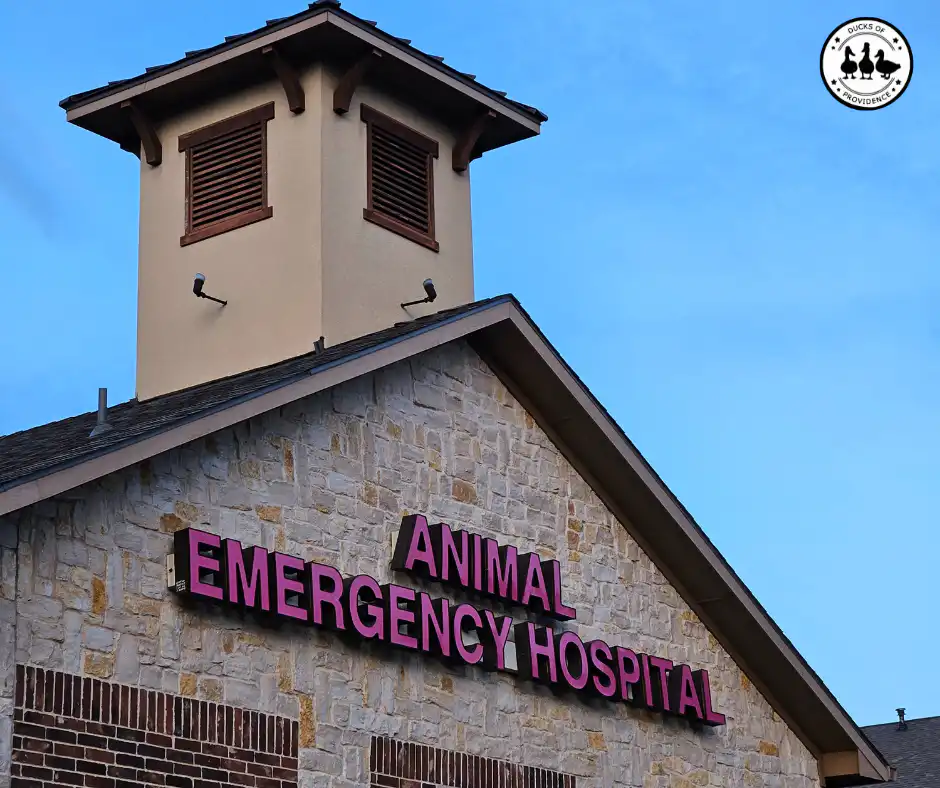
Finding a Duck-Savvy Vet: Tips for Pet Duck Owners
Last updated: February 28th, 2026
When one of your ducks shows signs of illness or injury, time is of the essence. But for many duck owners, finding a veterinarian who understands duck health can be a challenge. Unlike cats and dogs, ducks aren’t commonly treated in most small animal clinics, and not all exotic vets are experienced with waterfowl.
After years of caring for our own flock of pet ducks, we’ve learned firsthand what to look for in a competent, duck-savvy vet. This post will walk you through how to find the right vet, questions to ask, and what to do if there’s no duck vet nearby.
Ducks of Providence is free, thanks to reader support! Ads and affiliate links help us cover costs—if you shop through our links, we may earn a small commission at no extra cost to you. Thanks for helping keep our content free and our ducks happy! 🦆 Learn more
Part of the Duck Health & Anatomy Hub, Evidence-based medical resources and anatomical research.
Why a Duck-Savvy Vet Matters
When it comes to ducks, general veterinary knowledge isn’t always enough. Ducks are anatomically and physiologically different from more commonly seen pets like dogs, cats, or even chickens. These differences impact how illnesses present, how medications are metabolized, and how procedures should be performed.
A duck-savvy vet isn’t just “nice to have”. They can be the difference between a fast recovery and a tragic loss.
Here’s why their expertise is so important:
Unique Physiology and Anatomy
Ducks have specialized systems that many vets aren’t trained to manage unless they’ve worked with waterfowl. Their reproductive system, for example, is highly sensitive and prone to disorders like egg binding, internal laying, or salpingitis. Their skeletal structure and feet are also different from land birds, predisposing them to specific mobility and bumblefoot issues.
A duck-experienced vet will know:
- That ducks have a multi-chambered cloaca, making reproductive exams more complex
- How to position a duck correctly for X-rays or blood draws without causing stress or injury
- Which internal structures are normal in a duck vs. alarming in other birds
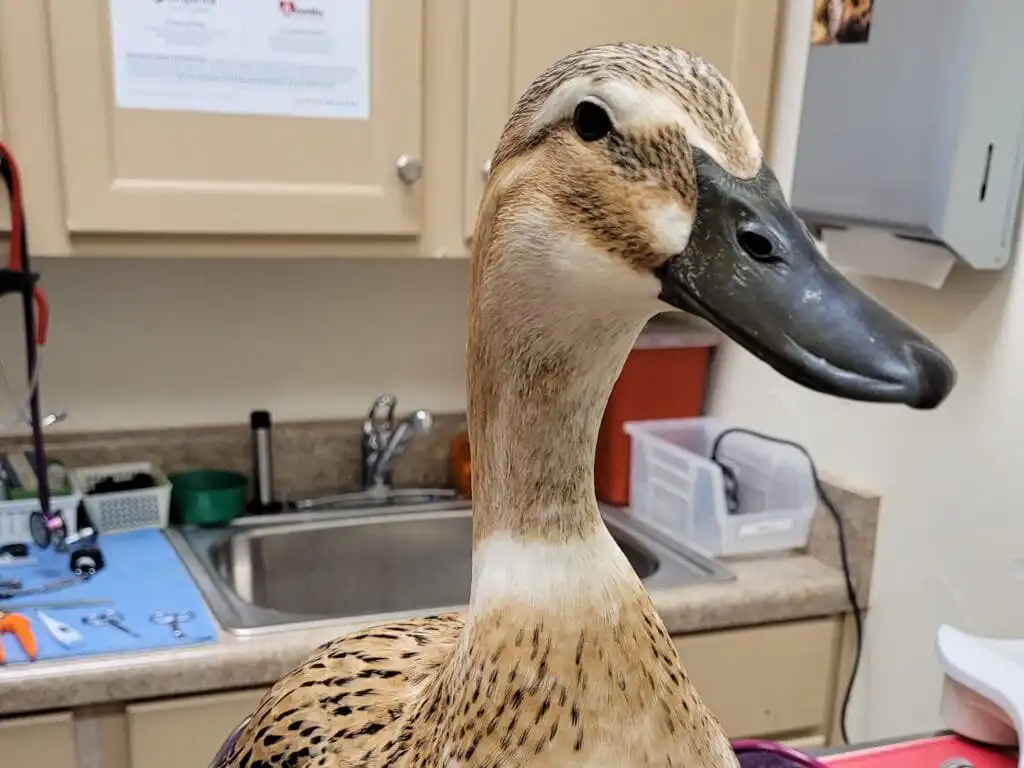
Correct Medication Choices and Dosing
Ducks metabolize medications differently than mammals and even other birds. Certain antibiotics and pain relievers commonly prescribed for dogs or cats can be dangerous for ducks, and dosage errors are easy to make without species-specific knowledge.
A duck-savvy vet will:
- Avoid medications that are toxic to ducks (like some sulfa drugs or high-dose steroids)
- Prescribe the correct form and dosage based on weight and species
- Understand how frequent access to water affects drug delivery (especially for oral meds mixed in feed)
This is especially critical if your duck is egg-laying, as some medications can be passed into the eggs or impact reproductive function.
Diagnostic Know-How
Reading test results on a duck isn’t the same as reading them for a dog. Normal blood values for ducks differ significantly, and misinterpretation can lead to incorrect treatments. For example, elevated white blood cells may mean infection, or just stress from handling.
Vets experienced with ducks can:
- Interpret duck-specific CBC and biochemistry results
- Recognize early signs of metal toxicity, which is more common in ducks than most people realize
- Use imaging like radiographs or ultrasounds to detect eggs, masses, or blockages in a way that’s safe and effective
Reproductive Care and Hormonal Management
If you have female ducks, you’ll likely face reproductive challenges at some point. From egg binding to chronic laying, these issues can escalate quickly.
An experienced duck vet can:
- Safely place hormone implants like deslorelin to stop chronic laying
- Perform gentle cloacal exams to feel for eggs or inflammation
- Recognize early signs of reproductive disease before it becomes life-threatening
We’ve been through this with our own girls. Having a vet who understood not just the symptoms, but the underlying reproductive cycle of ducks made a world of difference for Krümel’s treatment.

Behavioral Insight and Stress Management
Ducks are prey animals and can mask signs of illness until they’re in critical condition. They also become stressed easily, which can exacerbate health problems.
A duck-savvy vet knows how to:
- Handle ducks gently and confidently, minimizing trauma
- Identify subtle signs of pain or distress
- Create a low-stress environment in the clinic to prevent shock or injury
In short, when your duck is sick or injured, you want someone who speaks “duck.” Someone who won’t guess. Someone who understands that your pet duck isn’t “just poultry”, they’re family.
This kind of vet is not just a medical resource, but a true partner in your duck’s lifelong care.
How to Start Your Search
Finding a vet who understands ducks may take some digging, especially if you don’t live near a major city or veterinary college. But don’t worry, it’s entirely possible, and we’ve done it ourselves. The key is to start your search before there’s an emergency, so you’re not scrambling when your duck needs help.
Here’s how to begin your search with purpose and confidence:
Look for Avian or Exotic Animal Vets
Start by identifying clinics that see exotic pets or birds. Ducks are technically considered exotic pets in veterinary medicine, even though many of us consider them just as important as our dogs and cats. Use tools like:
- The Association of Avian Veterinarians (AAV) Find-a-Vet tool
- Duck DVM Vet Finder
- Your state veterinary board’s website
- Veterinary school directories (some vet schools offer care to the public through teaching hospitals)
When calling clinics, don’t stop at “Do you treat ducks?” Ask more specifically:
- “How many ducks have you treated in the past year?”
- “What kinds of duck issues are you familiar with: injuries, laying problems, metal poisoning?”
- “Do any of your vets keep ducks personally?” (You’d be surprised, some do!)
Even if they don’t specialize in ducks, an honest answer gives you clarity on what to expect.
Make Targeted Phone Calls
Once you have a shortlist, start calling clinics directly. Ask to speak with a vet tech or receptionist and explain that you have pet ducks. Be clear that you’re looking for someone with specific experience, not just a willingness to try.
Here are a few conversation starters that can help:
- “I’m looking for a vet who has handled egg binding or hormone implants in ducks. Is there someone at your clinic with that kind of experience?”
- “We have a flock of pet ducks, and we’re putting together a care plan that includes regular check-ups and emergency care. Would one of your vets be a good fit?”
- “What’s your policy for avian emergencies? Are you open on weekends, or do you refer to a specialist?”
Keep notes during each call. Vets who express curiosity, ask questions about your setup, or even admit they’re willing to learn more about ducks are worth considering, especially in areas where options are limited.
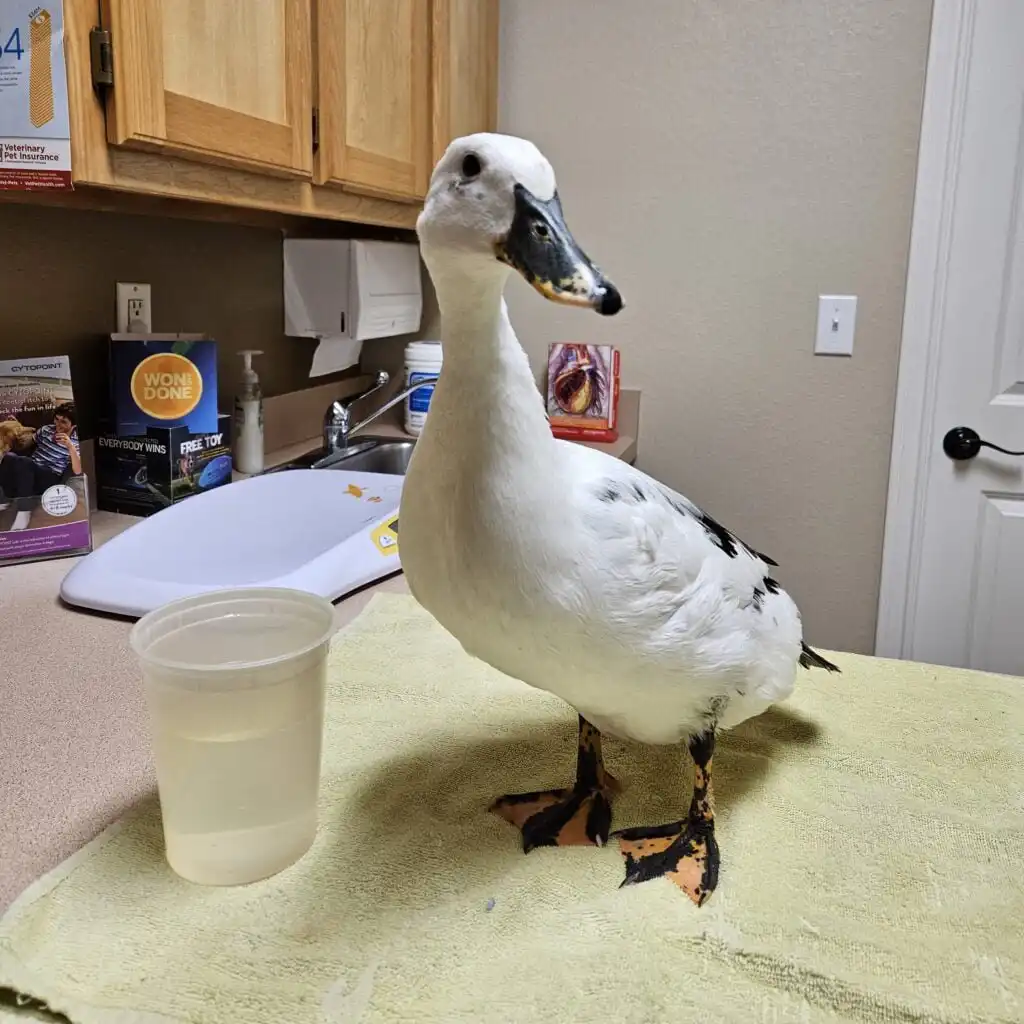
Tap Into Duck-Keeper Communities
Duck owners are some of the most supportive and resourceful people you’ll meet. Local and national duck-keeping groups can be a goldmine for vet recommendations.
Places to check:
- Facebook groups like “Raising Ducks and Geese,” “Backyard Ducks“, “Chicken Vet Corner’s Chicken Talk (ONLY approved Vets/Contributors comment),” or your state-specific poultry group
- Reddit threads (e.g., r/ducks or r/backyardpoultry)
- Instagram or TikTok (search hashtags like #duckvet or #petduckcare)
- Your local feed store—surprisingly, they often know who the “bird vet” in town is!
Don’t hesitate to post and ask:
“Does anyone in [Your City/State] have a duck-savvy vet they recommend? I’m looking for someone who has treated pet ducks, not just farm flocks.”
You’ll likely hear from fellow duck lovers who’ve been in your shoes and are happy to help.
Map Out Options for Emergencies
Even if your closest vet doesn’t specialize in ducks, it’s smart to map out the nearest avian specialty hospital or 24/7 emergency clinic that can provide triage in a crisis. Call ahead and ask what services they offer for ducks, and if they’re comfortable administering supportive care until you can reach your primary vet.
You can even keep a laminated list of emergency contacts taped inside your duck coop or on your fridge. We do!
Build a Relationship Before You Need One
Once you’ve found a potential vet, schedule a wellness visit when your duck is healthy. This gives the vet a chance to examine your duck without the pressure of an emergency and lets you see how they handle waterfowl.
This initial visit is also a good time to:
- Discuss your duck’s diet, housing, and routines
- Establish your duck as a patient on file
- Ask about after-hours care or emergency procedures
- Share any past medical history (especially if your duck has had reproductive issues or metal exposure)
Having this relationship in place means that if something does happen, you’re not a stranger calling in a panic, they’ll already know you and your duck.
What to Do If You Can’t Find a Duck Vet Nearby
Not everyone has access to an avian or exotic vet, especially one who has actual experience treating ducks. Many rural or even suburban areas lack clinics equipped to handle waterfowl. But don’t worry, if this is your situation, you’re not alone, and you’re not powerless. With preparation and creativity, you can still give your ducks excellent care.
Here’s what we recommend if you’re struggling to find a duck-savvy vet nearby:
Partner with the Most Open-Minded Vet You Can Find
Even if your local vet doesn’t specialize in ducks, some are willing to learn. The ideal situation is a vet who says, “I haven’t treated many ducks, but I’m open to working with you, consulting references, and learning more.” That attitude can go a long way.
Look for:
- Small animal vets who also treat backyard chickens or parrots
- Mixed-practice vets who see farm animals
- Vets affiliated with university extension services
Once you find a vet willing to help, be ready to advocate for your duck. Come to appointments prepared with accurate resources and be respectful. It’s a partnership.
💡 Tip: Ask if your vet is willing to consult with an avian specialist remotely. Many experienced duck vets are open to phone or email consults with other professionals.
Educate Yourself and Build a Duck Health Library
In the absence of local expertise, you become your duck’s first line of defense. That means learning how to recognize early signs of illness and knowing when it’s time to get help, even if it means a long drive or a telehealth consult.
Consider building a duck health binder or digital folder with:
- Dosage charts for common duck-safe medications
- Symptoms of common illnesses (like egg binding, bumblefoot, respiratory infections, or lead poisoning)
- Guides to normal vs. abnormal duck poop, weight, appetite, and behavior
- Contact info for the nearest emergency clinic, even if it’s an hour or two away
Recommended resources include:
- The Ultimate Pet Duck Guidebook by Kimberly Link
- The Merck Veterinary Manual (free online)
- Avian medicine textbooks (your vet may even appreciate you sharing these)
- Reliable websites such as The Poultry DVM or veterinary school extension pages
Having well-researched, printed information on hand can make a big difference when discussing treatment options with a non-avian vet.
Create a Fully Stocked First Aid Kit
In remote areas, response time matters. A well-prepared first aid kit allows you to stabilize your duck at home while arranging professional care. We always keep ours ready and updated.
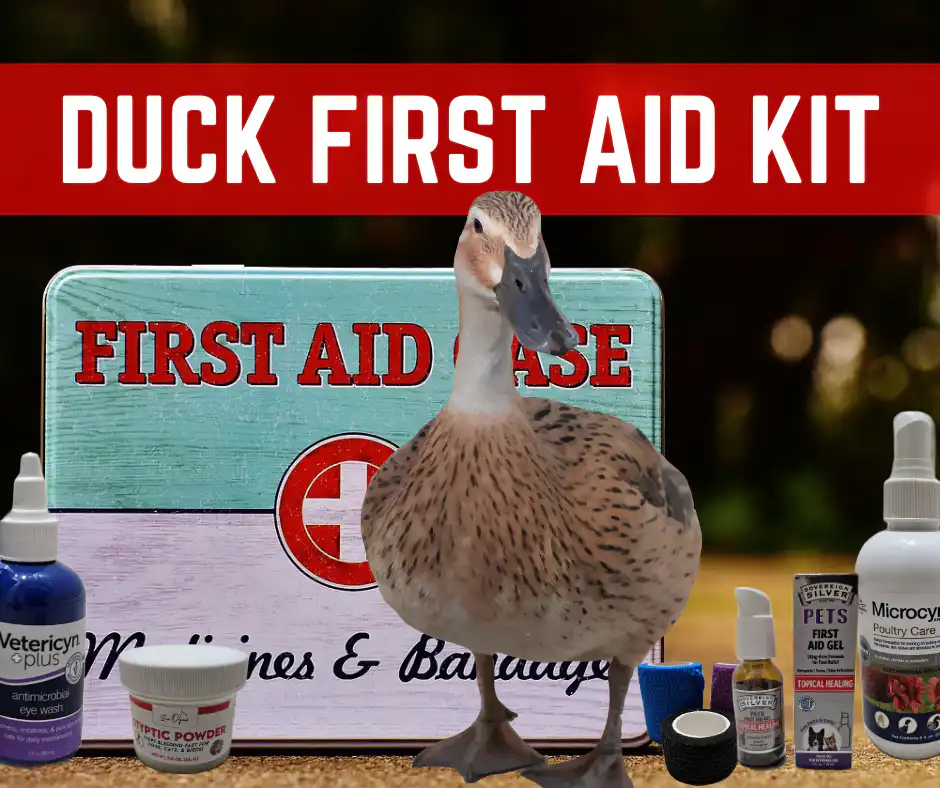
Essentials include:
- Saline solution
- Vetericyn wound spray
- Non-stick gauze pads and vet wrap
- Syringes (for administering fluids or medications)
- Electrolyte solution (like Save-A-Chick or Nutri-Drench)
- Oral antibiotics and antifungals (if prescribed and dosed appropriately)
- Gloves, scissors, thermometer, and scale
Optional but helpful:
- Epsom salts (for foot soaks)
- Activated charcoal (for toxin ingestion—ask a vet first)
- Heat lamp or heating pad for shock
- Soft-tipped feeding syringes for supportive feeding
Check out our complete DIY Duck First Aid Kit checklist or our curated Amazon shopping list.
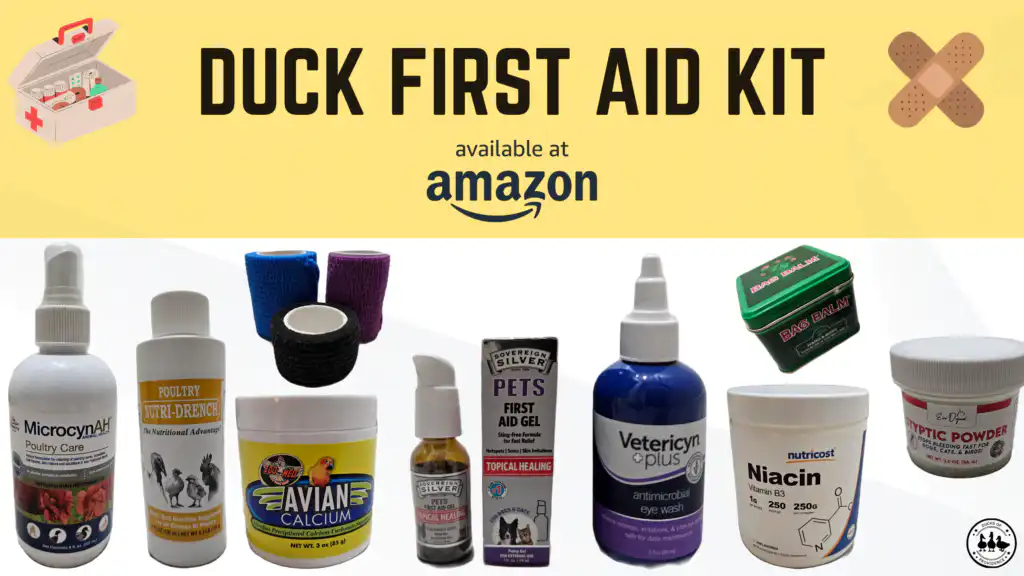
Know When It’s Time to Travel
Sometimes, no amount of preparation can replace specialized care. If your duck is showing signs of a life-threatening issue, like egg binding, severe injury, persistent vomiting, or suspected poisoning, it may be time for a road trip.
We’ve driven several hours when one of our ducks needed an X-ray or blood work that local clinics simply couldn’t offer. It’s not ideal, but it can be life-saving.
Before you hit the road:
- Call the clinic to confirm they can see ducks
- Ask if they have handled similar cases
- Bring your duck in a secure, well-ventilated carrier with soft bedding and access to water if the trip is long.
- Pack copies of any medical history, photos of symptoms, and a list of what your duck has eaten or been exposed to
This can help the vet assess the situation quickly upon arrival.
Use Telemedicine and Online Consults When Possible
In some cases, an online consult with a waterfowl expert may be enough to guide treatment. While telemedicine laws vary by state, some avian vets offer paid phone or email consults to support local vets or advise owners directly when allowed.
You can also:
- Join vet-moderated poultry forums (some have vet contributors)
- Reach out to avian vets at universities or waterfowl rescue organizations
- Follow knowledgeable duck accounts on Instagram or YouTube, but always fact-check advice before acting
Remember: online support is not a substitute for in-person care, but it can help fill the gap when options are limited.
Our Experience: The Vet Who Helped Save Krümel
When our beloved Krümel began showing signs of illness, lethargy, weakness, and reduced appetite, we knew something was off. As a female duck with a history of reproductive issues, her symptoms raised immediate concern. Thankfully, we had an established relationship with our local vet, who was familiar with treating ducks. She took our concerns seriously and acted swiftly.
During Krümel’s initial exam, the vet noted her subdued behavior and ran a comprehensive panel of blood tests. The results were concerning: elevated white blood cells, abnormal pancreatic enzyme levels, and most notably, extremely high zinc concentrations. Although an X-ray didn’t reveal any visible metal object, it was clear that something more complex was going on.

Recognizing that Krümel needed more specialized care, our vet referred us to Dr. Antinoff at Texas Avian & Exotic Hospital, a veterinarian with extensive experience treating waterfowl. That referral turned out to be life-saving.
Dr. Antinoff’s expertise with ducks was immediately apparent. She reviewed Krümel’s blood work in detail, performed a more advanced diagnostic assessment, and confirmed the high zinc levels were a serious concern. She recommended chelation therapy to help remove the heavy metals from Krümel’s system. The treatment was carefully planned in three 10-day rounds, with rest periods in between, using calcium disodium EDTA. At the same time, she identified that Krümel was also dealing with ongoing reproductive stress and suggested a deslorelin hormone implant to stop her from laying eggs while her body healed.
We felt immense relief to be in the hands of a vet who truly understood ducks, not just birds or poultry, but ducks, with all their nuances and specific care needs. Dr. Antinoff’s guidance was not only medically sound but also compassionate and supportive throughout the entire process.
Krümel’s recovery wasn’t immediate, but thanks to this collaborative care approach between our local vet and a dedicated duck specialist, she pulled through. She’s now back to her bright, curious self.
This experience reinforced something we can’t stress enough: establish care before there’s an emergency, and if your vet reaches their limits, seek out someone with deeper experience. That continuity and willingness to refer made all the difference in Krümel’s case, and it’s something every duck owner should plan for.
Final Thoughts
As duck parents, we want nothing more than to give our feathered companions the happiest, healthiest life possible. But ducks aren’t like dogs or cats, and when something goes wrong, it’s essential to have a vet who understands their unique needs.
Finding a duck-savvy vet might take time, persistence, and a little creativity, especially if you live in an area with limited access to avian specialists. But it’s one of the most important steps you can take for your ducks’ long-term well-being. Whether it’s diagnosing a reproductive disorder, treating an injury, or simply understanding safe medication dosing, a vet with real duck experience can make all the difference.
We’ve lived through it. From everyday checkups to complex care plans like Krümel’s, having the right veterinary support, along with solid preparation on your end, can turn a frightening situation into a manageable one.
So start your search early. Ask questions. Build relationships. And know that if you ever find yourself far from expert help, you still have options, and a whole community of duck lovers ready to support you.
Your ducks depend on you to be their voice, their advocate, and their protector. With a little planning, you can make sure they always have the care they need.
Related Articles
- 16 Common Duck Health Conditions You Should Know About
- 31 Must-have Items for Your Pet Duck First Aid Kit
- Safely Medicating Ducks: A Guide for Pet Duck Owners
- Emergency Care for Ducks After a Predator Attack: First Aid, Treatment, and When to See a Vet
Deepen your understanding of avian wellness. Explore the full Duck Health & Anatomy Library for more specialized care guides.
